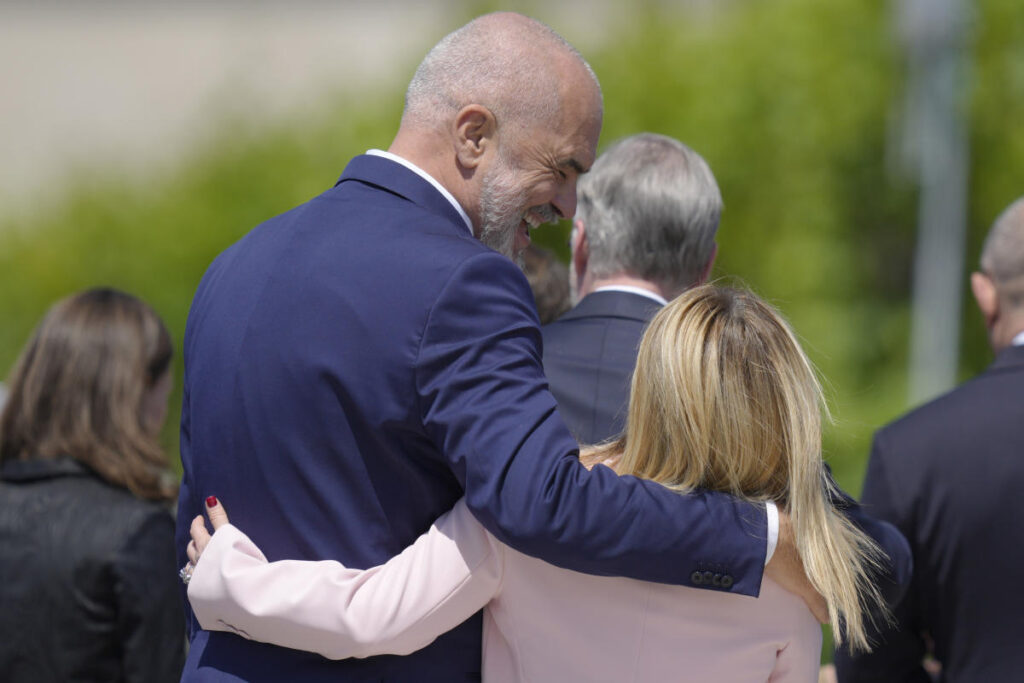Italy has begun transferring migrants to Albania as part of a controversial initiative to process asylum-seekers outside its borders. The first group includes 16 men—10 from Bangladesh and 6 from Egypt—who were rescued at sea after attempting to cross from Libya to Europe. A naval ship set sail from Lampedusa, marking the beginning of what the Italian government hopes will streamline the handling of asylum claims. The ship is expected to arrive in Albania shortly, with Italian officials emphasizing the necessity of this approach in light of increased migration pressures on their shores.
Under the leadership of Premier Giorgia Meloni, Italy’s far-right government has officially launched two processing centers in Albania, which are intended to accommodate a large influx of male migrants seeking asylum. Initially, these centers are designed to house up to 400 people, with plans to increase capacity to 880 within a few weeks. Importantly, the initiative excludes women, children, the elderly, and vulnerable individuals such as torture victims, who will continue to be accommodated in Italy. The government has pledged that families will not be separated during this process, an important consideration amid growing concerns for migrant welfare.
The five-year agreement facilitating this arrangement was endorsed by European Commission President Ursula von der Leyen last year. The deal has drawn criticism from human rights organizations, which argue that it sets a dangerous precedent in handling migrant populations. They warn that the approach of outsourcing asylum processing can undermine the protections afforded by international laws and norms. Human rights advocates are particularly concerned about the potential implications for migrants’ rights and the scrutiny of their treatment during the asylum process.
To ensure oversight, the United Nations High Commissioner for Refugees (UNHCR) has expressed deep concerns over the plan and is providing monitoring through one of its independent teams on the ship traveling to Albania. The agency plans to supervise the first three months of operations to uphold the rights and dignity of the migrants involved. The UNHCR emphasizes the importance of protecting the fundamental rights of those seeking asylum, especially since the agreement allows migrants to retain their rights to apply for asylum in Italy and seek resolution to their claims within the country.
The arrangement between Italy and Albania stipulates that Albania will accommodate up to 3,000 male migrants, while Italy promises to expedite their asylum claims. It is also significant that Italy is investing about 670 million euros ($730 million) over the five years to set up and run these facilities. While Italian jurisdiction will oversee the centers, the operational security will be managed by Albanian guards stationed outside the facilities. This complex arrangement illustrates the growing trend within Europe of countries attempting to manage migration flows by shifting responsibilities to neighboring nations.
As the numbers of asylum-seekers and migrants continue to rise in Europe, Meloni’s administration and its allies are advocating for a more equitable distribution of migration responsibilities among European nations. The ongoing migration crisis has prompted debates about effective strategies to manage arrivals while balancing humanitarian responsibilities and national security concerns. With this development and the potential expansion of the initiative, Italy’s approach may shape future discussions on migration policy and international cooperation within the EU. As scrutiny from human rights organizations and international agencies continues, the ramifications of such a plan could redefine how European nations tackle the complex challenges associated with migration and asylum processes.

